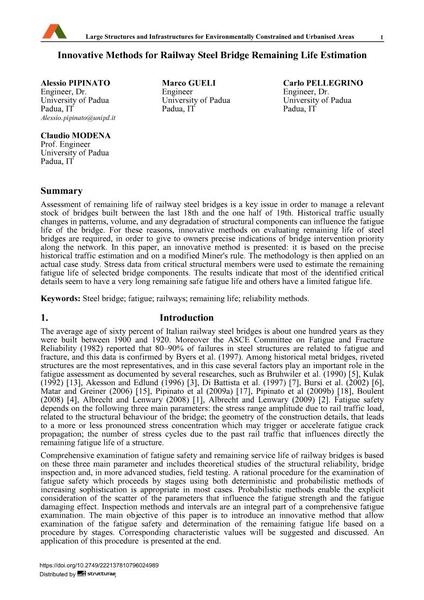Innovative Methods for Railway Steel Bridge Remaining Life Estimation

|
|
|||||||||||
Détails bibliographiques
| Auteur(s): |
Alessio Pipinato
Marco Gueli Carlo Pellegrino Claudio Modena |
||||
|---|---|---|---|---|---|
| Médium: | papier de conférence | ||||
| Langue(s): | anglais | ||||
| Conférence: | IABSE Symposium: Large Structures and Infrastructures for Environmentally Constrained and Urbanised Areas, Venice, Italy, 22-24 September 2010 | ||||
| Publié dans: | IABSE Symposium Venice 2010 | ||||
|
|||||
| Page(s): | 384-385 | ||||
| Nombre total de pages (du PDF): | 7 | ||||
| Année: | 2010 | ||||
| DOI: | 10.2749/222137810796024989 | ||||
| Abstrait: |
Assessment of remaining life of railway steel bridges is a key issue in order to manage a relevant stock of bridges built between the last 18th and the one half of 19th. Historical traffic usually changes in patterns, volume, and any degradation of structural components can influence the fatigue life of the bridge. For these reasons, innovative methods on evaluating remaining life of steel bridges are required, in order to give to owners precise indications of bridge intervention priority along the network. In this paper, an innovative method is presented: it is based on the precise historical traffic estimation and on a modified Miner's rule. The methodology is then applied on an actual case study. Stress data from critical structural members were used to estimate the remaining fatigue life of selected bridge components. The results indicate that most of the identified critical details seem to have a very long remaining safe fatigue life and others have a limited fatigue life. |
||||
| Mots-clé: |
pont en acier
|
||||
